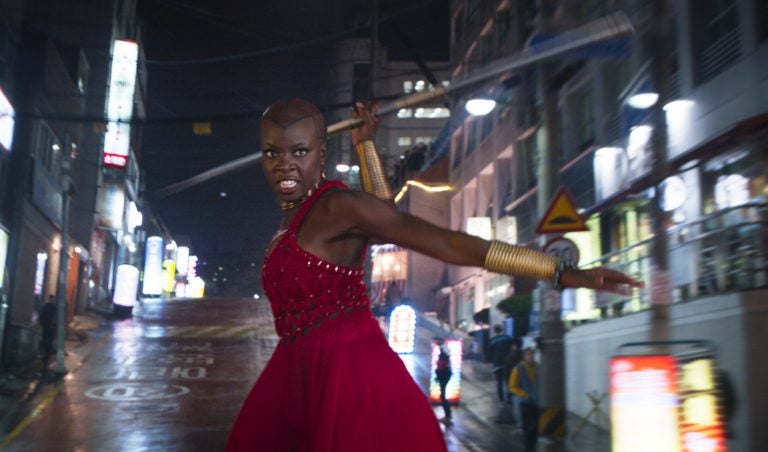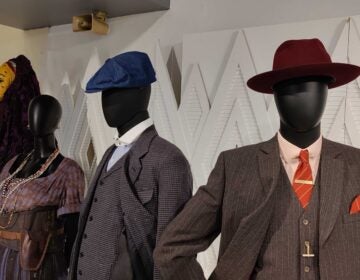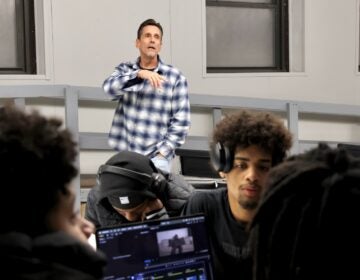Why ‘Black Panther’ matters
The film, with its visually stunning portrayal of Africa and its people, is filled to bursting with truth about the black experience.
Listen 3:36
This image released by Disney shows Danai Gurira in a scene from Marvel Studios' "Black Panther." (Marvel Studios-Disney via AP)
I’ve seen the record-breaking film “Black Panther” twice now, and the film, with its visually stunning portrayal of Africa and its people, is filled to bursting with truth about the black experience.
Its majestic portrayal of black power and its crafty push for black freedom play out through a family dynamic that winds through the film’s tight plot. The result is an experience that is especially enthralling to black audiences who’ve longed to see themselves in such cinematic splendor.
In satisfying that itch, Black Panther earned an estimated $235m over the Friday-to-Monday President’s Day weekend, according to Forbes. That’s the kind of record-breaking performance that will create opportunities for other black films to be made. As a novelist, I’m excited by the possibilities, but as an audience-member, I’m thrilled that “Black Panther” created an even bigger opportunity. It created the opportunity for black camaraderie.
I watched excitedly as African-Americans showed up to watch the film in African garb, their dark skin shining in all its brilliance. I engaged in the film in ways I’d never done before, dressing as one of Oakland’s Black Panthers as my wife sat beside me in combat gear.
We were there not only to enjoy a film, but to fight the idea that European imagery is the ideal. We were there to revel in a narrative that centered on black brilliance. We were there to enjoy the pictures as much as to understand the plot.
That much was evident to me when I saw the film for the second time. My daughter and her teenage friends sat to my right. To my left was a middle-aged couple that was perhaps a few years older than myself. I could see the woman’s eyes dancing as she took in the images before her.
“She bad!” the woman said gleefully as the screen filled with the image of Okoye, a dark-skinned and majestic female general played by actress Danai Gurira.
It was a sentiment the woman would repeat again and again throughout the film, as she exclaimed how sharp, how bad, how utterly powerful the characters appeared, right up through the very end of the film.
That, in my view, is the power of “Black Panther.” It moves black people beyond the fake divisions that have kept us apart. Dark skin and light skin, income and social status, education and street smarts.
In “Black Panther,” all of us — no matter where we come from — can see the beauty of our blackness stretched across the big screen. We can hear the music of African accents dancing in our ears. We can experience black hip hop booming through the air. We can see our blackness celebrated on the world’s biggest stage.
That’s why my community is greeting this film as if it is our personal Super Bowl. Because, while the Eagles waited nearly six decades for a championship, black folks have waited four centuries for representation.
We waited through slavery and Jim Crow, through lynching and segregation, through poverty and police brutality.
And now, after all that waiting, we see “Black Panther,” where we are the heroes and the conquerors, the fathers and the sons, the queens and the sisters, the warriors and the kings.
We are powerful because ours is a truth that is only now beginning to be fully realized. But telling our truth begins with telling our stories. It begins with grooming our griots. It begins with standing up and saying you will no longer portray us as slaves, no longer mistreat our community, no longer decide what’s good for our neighborhoods. We will decide that for ourselves.
That’s why “Black Panther” matters. Knowing who we can be is as important as knowing who we are. And thanks to “Black Panther,” we know we can be kings.
WHYY is your source for fact-based, in-depth journalism and information. As a nonprofit organization, we rely on financial support from readers like you. Please give today.





